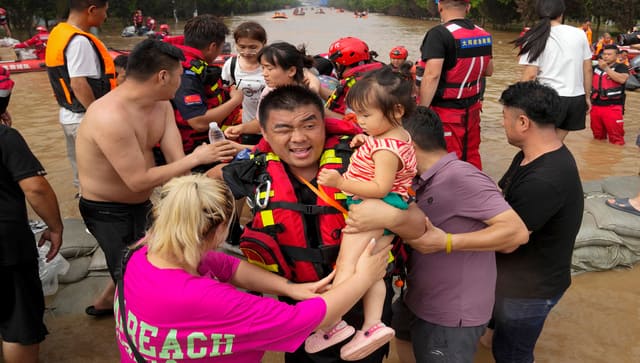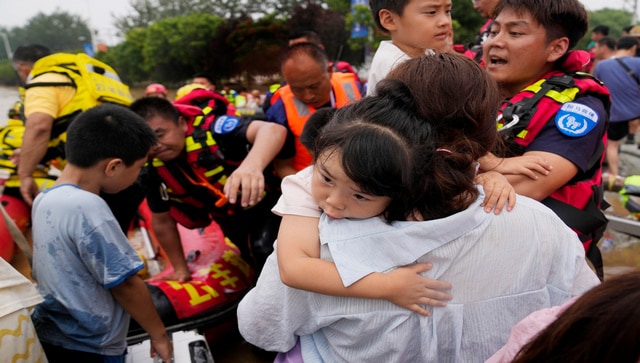Beijing received a historic amount of rainfall over the past few days. Streets have been turned into canals with emergency crews rescuing citizens, bridges have been submerged, cars left waterlogged, and the supply of electricity and drinking water knocked out. With China’s capital in deep trouble, authorities made the decision to save Beijing by diverting water – by flooding Hebei province. But what did authorities do exactly? And what’s the fallout? Let’s take a closer look: What did they do? According to SCMP, authorities began draining Beijing of floodwater by opening up areas along waterways. The newspaper quoted Hebei’s Emergency Management Department as saying seven ‘flood storage zones’ had been activated in low-lying areas. These zones are a central component of China’s flood control system.
In all, around 1.8 billion cubic metres of water were diverted to “ease pressure on Beijing and Tianjin”.
SCMP quoted engineer Cheng Xiaotao as telling state broadcaster CCTV “diverting floodwaters into flood storage can reduce the river’s peak flow and relieve the pressure on downstream cities”. According to the BBC, authorities drained Beijing of water through connected dams, reservoirs and waterways. What’s the fallout? The neighbouring province of Hebei has been completely deluged. Authorities in Hebei said around 850,000 people have been relocated. Among the hardest hit areas is Zhuozhou, a small city that borders Beijing’s southwest. On Tuesday night, police there issued a plea on social media for lights to assist with rescue work. Rescue teams traversed the flooded city in rubber boats as they evacuated residents who were stuck in their homes without running water, gas or electricity since Tuesday afternoon. “I didn’t think it would be that severe, I thought it was just a little bit of water and that it would recede,” said 54-year-old Wang Huiying. She ended up spending the night on the third floor of her building as the water seeped into the first floor, which holds her steamed bread shop. All the machinery is now underwater. [caption id=“attachment_12960532” align=“alignnone” width=“640”] China’s capital has recorded its heaviest rainfall in at least 140 years over the past few days. AP[/caption] Some ave been left with nothing, but feel lucky to be alive. “We brought nothing with us,” a woman holding a baby told BBC.
China’s capital has recorded its heaviest rainfall in at least 140 years over the past few days. AP[/caption] Some ave been left with nothing, but feel lucky to be alive. “We brought nothing with us,” a woman holding a baby told BBC.
“We needed to just get out and keep this baby safe”.
On Wednesday, waters in Gu’an county in Hebei, which borders Zhuozhou, reached as high as halfway up a pole where a surveillance camera was installed. Gu’an county resident Liu Jiwen, 58, was evacuated from his village on Tuesday night. “There’s nothing we can do. It’s natural disaster,” he said. Two other people were trying to pass through the flooded areas to rescue a relative trapped in a nearby village. Others, however are upset. According to BBC, many took to social media to complain of not being given a heads-up before the authorities made their decision. The remarks from Hebei Communist Party boss Ni Yuefeng that the province should “serve as the capital’s ‘moat’ haven’t gone over well. “Don’t Hebei’s own people need protection?” one irate internet asked, as per SCMP. Ex-Global Times editor-in-chief chimed in on his Weibo account, “We should not have the mindset of sacrificing anyone for the sake of protecting anyone, or treating one place as a moat for another.” “Is he Party Secretary of Hebei Province or Beijing? I’m confused,” a user asked, as per BBC. “Those in power only care about their superiors. Congratulations! He’ll be promoted. But the obedient 70 million residents of Hebei will be sacrificed,” another fumed. Still others complained about how long rescue efforts were taking. “We are taking on the flood water discharge from Beijing, so they should provide us with rescue and equipment, but there has been nothing,” a user on Weibo was quoted as saying by VOA. What do experts say? Some have criticised Beijing’s actions. Engineer Wang Weiluo told BBC, “China’s flood control network has a pecking order of protection giving priority to big important cities like Beijing, Tianjin and Shanghai, with the lowest order of importance being rural areas. Under China’s system, at the bottom are the ordinary people in the city and those in the countryside whose interests are not respected.” Wang, who left China after criticising the building of its Three Gorges Dam, said the flood waters could have been diverted to golf courses. [caption id=“attachment_12960542” align=“alignnone” width=“640”] Some experts criticised the authorities for not respecting the ordinary people in the countryside, but others said a review of city planning is needed[/caption] “To discharge the water there first would cause the least economic loss and have the least impact on human lives. But those who benefit from the country’s flood relief priorities are those who play golf there,” Wang added. Others said authorities need to relook at how cities are planned. Ma Jun, director of the Institute of Public and Environmental Affairs, said there should be a review of how cities are planned because some places experience repeat flooding.
Some experts criticised the authorities for not respecting the ordinary people in the countryside, but others said a review of city planning is needed[/caption] “To discharge the water there first would cause the least economic loss and have the least impact on human lives. But those who benefit from the country’s flood relief priorities are those who play golf there,” Wang added. Others said authorities need to relook at how cities are planned. Ma Jun, director of the Institute of Public and Environmental Affairs, said there should be a review of how cities are planned because some places experience repeat flooding.
“We need to avoid building large-scale construction … in low-lying areas,” Ma added.
The record rainfall from Doksuri, now downgraded to a tropical storm, may not be the last. Typhoon Khanun, which lashed Japan on Wednesday, is expected to head toward China later this week. The powerful storm, with surface winds of up to 180 kph (111 mph), may also hit Taiwan before it reaches China. Thousands of people were evacuated to shelters in schools and other public buildings in suburban Beijing and in nearby cities. The central government is disbursing 44 million yuan ($6.1 million) for disaster relief in affected provinces. The severity of the flooding took the Chinese capital by surprise. Beijing usually has dry summers but had a stretch of record-breaking heat this year. With inputs from agencies
)